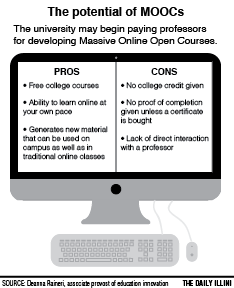University increases free online college course development

Apr 8, 2015
Last updated on May 10, 2016 at 07:48 p.m.
The convenience of online courses does not often outweigh the expense, allowing students to learn online without spending tuition dollars.
Massive Open Online Courses, or MOOCs, are free, online college courses.
In an effort to compensate professors who spend time creating MOOCs, the Academic Senate is set to discuss a resolution on providing funding for professors who develop MOOCs.
Various university professors around the world develop these courses, which enroll tens of thousands of learners, said Charles Tucker, vice provost for Undergraduate Education and Innovation. There are no prerequisites to take any MOOCs.
Get The Daily Illini in your inbox!
“All you need is an internet connection and an email address,” Tucker said.
MOOCs are offered through various online platform companies partnered with universities.
The University was the first land-grant university to partner with Coursera, one of the largest MOOC providers, Tucker said.
“There is a brand recognition piece to this,” said Deanna Raineri, Associate Provost of Education Innovation. “We felt that this was a good opportunity for the University of Illinois to show the world that we have very high quality education here.”
Students cannot earn credit toward their degree through most Moocs.
“It was sort of started as an ‘educate the world’ kind of mission,” Raineri said. “The philosophy was there are a lot of people around the world who cannot access education, so let’s bring education to them.”
However, Raineri believes in the future, MOOCs will be offered for college credit.
“Everyone is talking about this,” she said.
Tucker agreed with Raineri, citing that the College of Business offers a regular, for-credit online course that has a free, MOOC counterpart. While this MOOC cannot be taken for credit, Tucker said exploration is an important first step.
“The professors really weren’t in it for the money,” Raineri said. “But it will make those professors that we’re currently working with see that we recognize their outstanding efforts.”
This resolution comes at a time when MOOC development is really taking off, Tucker said.
Edward Tanguay, an American software developer living in Berlin has been tracking his progress in MOOC courses on a personal website since 2012.
“I got an email stating that there would be 187 new MOOCs starting in April,” Tanguay said. “It just continues to grow.”
The revenue MOOCs bring to the University is projected to increase, Raineri said. Although MOOCs are offered for free, upon completion, a user can choose to purchase a $49 certificate, which verifies the user completed the course.
“The University receives half of the revenue from that certificate,” Tucker said.
Although Raineri said it was too early to tell what the projected increase in revenue would look like, she said it would bring a “nice bit of revenue” to the University.
Tucker said MOOCs are not just single-purpose material that only benefit online learners.
The material developed for MOOCs is often reused in traditional online courses and blended in classes.
“MOOC development is not something that sits off in a box by itself,” Tucker said. “It’s part of the ecology of modern course development.”





